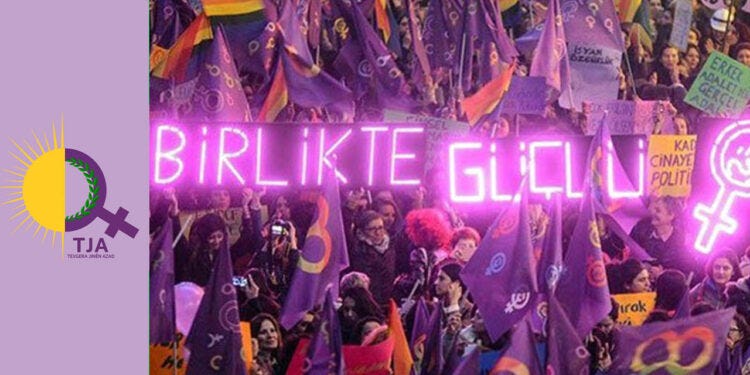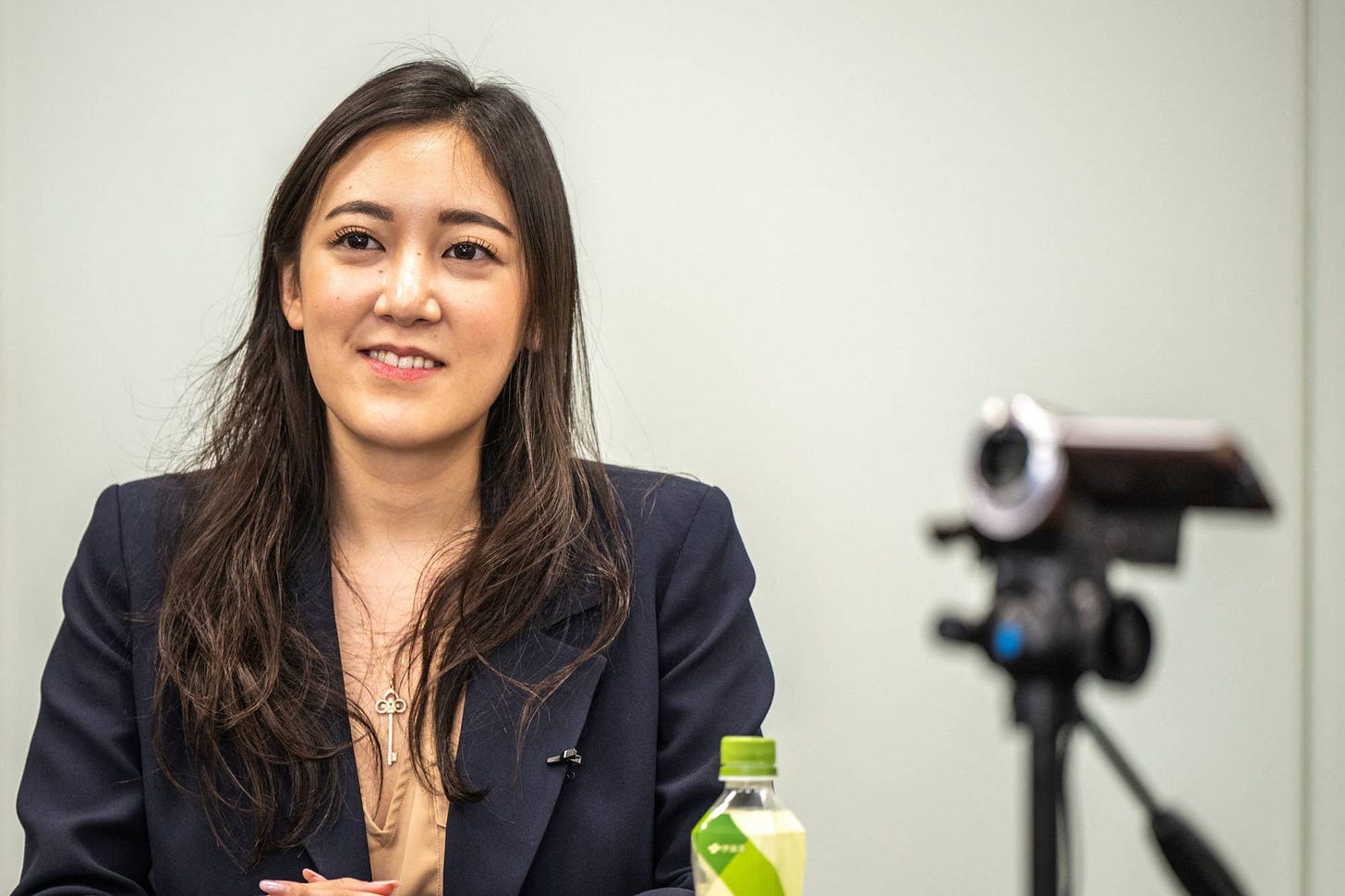Global Roundup: Sudan Sexual Violence, Turkey Women on Upcoming Elections, Jamaica LGBTQ+ Rights, West Africa's First LGBT Magazine, Japan Women in Politics
Curated by FG Contributor Samiha Hossain
Sudanese women take part in a protest decrying sexual attacks, after the UN said at least 13 women and girls were raped in mass protests against the army in Omdurman on December 23, 2021 [Ebrahim Hamid/AFP]
CW: sexual violence
Graphic details have been shared online as organisations and individuals grapple with internet connectivity issues to paint a disturbing picture of increasingly indiscriminate attacks on women as the war enters its fifth week. Sudanese capital Khartoum and el-Geneina in West Darfur are said to be suffering the highest cases of sexual violence.
Neimat Abubaker Abas, a senior programme adviser at Strategic Initiative for Women in the Horn of Africa (SIHA), says that refugees and internally displaced women have been particularly targeted. There have been six cases of refugee women having been raped since the outbreak of the conflict, according to SIHA.
In response to the reports of sexual violence, many women have taken to social media to report incidents. At the same time, medical professionals and psychologists have offered advice and support to those affected, including numbers where survivors can receive urgent treatment based on their location. Amira (not her real name), a young woman from Nyala in South Darfur, says that women are hiding indoors as reports of rape circulate. However, poor internet and phone connectivity have hampered communications.
We try to share info of pharmacies and clinics that can provide help for rape victims, but again, that’s patchy as we rely on WhatsApp groups and contacts to give us the info. Nyala is generally safer [but] el-Geneina is a horror story. What’s happening, there is far worse with the looting, kidnapping, continuous fighting and clashes and rape cases. -Amira
Time and time again, sexual violence is used as a weapon of war globally, yet it is often overlooked. Women in Sudan are forced to take matters into their own hands and resist by keeping each other safe and informed.
Their statement highlighted their ongoing resistance against the suppression of women’s rights and the recent attacks on the laws protecting them, such as the Istanbul Convention. They vowed to continue fighting for an end to violence against women, the rights of the LGBTQ+ community, the welfare of children, and the restoration of important pieces of legislation.
They called on all women to vote and safeguard the integrity of the electoral process in order to put an end to the existing regime. Turkey's current president, Recep Tayyip Erdogan, has been in power for two decades and has had an increasingly authoritarian rule.
The Free Women’s Movement (TJA) has also released a statement urging the public to participate actively in the second round of presidential elections on May 28. They emphasised the significant role of Kurdish women in the global fight against fascism, stating, “The revolt against the longest-standing colony has today turned into a revolution of freedom against fascism all over the world, especially in Kurdistan and Turkey.”
Their statement also stressed their responsibility to challenge the current government and strive for women’s freedom and social liberation, asserting, “We will not surrender our hope, future and freedom to tyranny and fascism.”
Renae Green, executive director of TransWave Jamaica
King Charles III’s coronation has accelerated plans for Jamaica to become a republic, and activists say it’s time for the country to take a big step forward on LGBTQ+ equality. Jamaica’s minister for legal and constitutional affairs Marlene Malahoo Forte said the ascension of a new British monarch sped up her nation’s plans to become a republic, formally breaking ties with the UK. Forte’s “urgent” referendum could be held as early as 2024.
Renae Green, executive director of TransWave Jamaica, believes the nation’s break with the British monarchy will bring about fresh opportunities to implement vital LGBTQ+ equalities legislation.
I think we’re going to become a republic, so we’re going to have a president as the head of our state. Even in that conversation, people are asking, ‘Where are the queer and trans people?’ You know, like 10 years ago, that would have never happened to me. And so to me, that’s progress, and it’s a testament to all that we’ve been doing and that we’ve been trying to achieve here. -Renae Green
Green says that violent acts against LGBTQ+ people, particularly trans Jamaicans, have become less frequent. But verbal attacks and discrimination remain rife, and she says it comes from the top as trans people “don’t exist” in Jamaica’s legislative framework in ways that affirm their identities. The country still lacks sweeping legislation that prohibits discrimination on the basis of sexual orientation and gender identity.
Jamaica’s Offences Against the Person Act, which was inherited under British colonial rule, criminalises ‘buggery’ or same-sex sexual intimacy with punishments of up to 10 years in prison with hard labour. The law has rarely been enforced, but Glenroy Murray, executive director of J-FLAG – Jamaica’s largest LGBTQ+ rights organisation – says it sends a “clear message about the place of LGBTQ+ people'' in the country.
It gives an implied licence to the general public to treat us as if we are second class citizens. While the law itself is not the cause of Jamaican homophobic and transphobic acts and mentalities, it definitely encourages them. -Glenroy Murray
With the increase in queer visibility, there has been a decline in violence towards the LGBTQ+ community, Murray notes. However, he says it hasn’t led to any legislation to protect the community. Those who live in rural areas and trans people don’t always benefit from these changes according to Murray. Still, he emphasises that the community continues to find joy and support amidst the challenges.
The truth is that LGBTQ+ Jamaicans have always been resilient. They have always created spaces of joy and celebration regardless of the challenges they face…We also have regular parties that are the lifeblood of the community. In recent years, we’ve had eight incident-free Pride activities. -Glenroy Murray
First issue of the Ivorian magazine dedicated to the LGBT community. © Sadia Mandjo
The publication of “Meleagbo,” the first magazine dedicated to West Africa’s LGBT community, originally set to hit shelves on May 12, has been delayed due to difficulties finding gay-friendly printers in the Ivory Coast. Launched by the NGO Gromo, which advocates LGBT rights in Abidjan, Côte d’Ivoire, the magazine promotes gay icons and highlights the community’s culture, history and victories.
Every day, homophobia is the first difficulty that we encounter. We are faced with printers who do not want to be associated with the LGBT community. If we had launched a fashion magazine, we wouldn't have had this kind of problem. So we [must] go at the pace of those who are willing to help us. -Emmanuel Niamien, chief editor
The magazine itself is about 40 pages, but they are difficult to fill: despite plenty of ideas coming in, few are willing to put their faces or names to the stories for fear of retaliation. The magazine’s zero issue, a mock-up of the magazine to promote it to the community, was launched last week at the annual Awawale Festival, which celebrates the LGBT community in Abidjan. The 30-something Ivorians say they launched “Meleagbo” to address a lack of representation of the LGBT community in mainstream media.
We hope to change people's mindsets with this magazine. To make people see that we are here, we have always been here, and that we are part of the people who are making changes to the system. -Emmanuel Niamien
Though Ivory Coast does not outlaw homosexuality, 70 to 83 percent of LGBT people are still victims of homophobia and continue to face death threats, assaults and rapes in Abidjan. Widespread discrimination even penalises LGBT people professionally. According to a survey conducted by Gromo in 2021, 70 percent of LGBT people are unemployed in Ivory Coast. To address this, some sections of Meleagbo are dedicated to job offers, professional advice and lists of queer-friendly companies. Meleagbo is a groundbreaking new project that will undoubtedly make waves once it gets into people’s hands.
Rei Murakami Frenzel, chair of the Murakami Family Foundation, which runs a mentorship program for women aspiring to join Japan's overwhelming male-dominated political scene, attends a lecture in Tokyo in December. | AFP-JIJI
Rinka Saito, the youngest participant of the program, is determined to run for office one day because “you can’t have true democracy without diversity.” Saito became interested in politics because she wanted to give hope to people with disabilities as she has had surgery for hearing loss. She said the foundation has helped her build a network and better understand the “good and bad aspects of the political world.”
Once elected, female leaders in Japan face a tough environment, describing sexual harassment, chauvinist habits and ingrained views of government as a man’s world. There are only two women in Prime Minister Fumio Kishida’s 19-member Cabinet, and parliament’s powerful 465-member lower chamber is 90% male.
Foundation chair Rei Murakami Frenzel, 28, was surprised so many people applied for the first program, which ran from November to March.
Japan has never had a female prime minister and that must change, said lawmaker Seiko Noda. Noda, 62, said she “couldn’t even find the women’s bathroom” when she started her political career in the Lower House three decades ago. And while she believes the situation is slowly improving, Noda is keen to encourage women to enter the field given the “overwhelming lack of young female politicians.”
Umeko Saito, a 75-year-old politician in Niseko, a small ski-resort town in Hokkaido, wants to see more women in local assemblies. Saito fought to end a tradition of hiring “companions” — women in their early 20s who serve drinks and chat with guests — for political events. Her efforts were successful and the custom has stopped. But Saito still feels that others view her as “an alien” in the political system and acknowledges that “many female politicians cannot speak up about harassment.” Though people have advised her to quit, she says she will not.
Samiha Hossain (she/her) is a student at the University of Ottawa. She has experience working with survivors of sexual violence in her community, as well as conducting research on gender-based violence. A lot of her time is spent learning about and critically engaging with intersectional feminism, transformative justice and disability justice.
Samiha firmly believes in the power of connecting with people and listening to their stories to create solidarity and heal as a community. She refuses to let anyone thwart her imagination when it comes to envisioning a radically different future full of care webs, nurturance and collective liberation.






